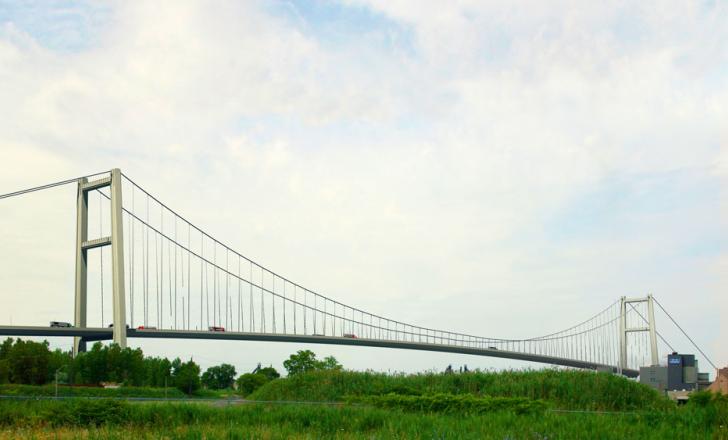The bidding process has started for the Gordie Howe International Bridge that will link Detroit in the US state of Michigan and Windsor, in the Canadian province of Ontario.
The Windsor-Detroit Bridge Authority (WDBA) has sent out a request for qualifications (RFQ) for the bridge that will likely be either cable stayed or suspension to cross the Detroit River.
The bridge also likely will come with a hefty price tag – around US$1.62 billion, as World Highways reported in May in a feature on the proposed b

Suspension option, artist impression (source: WDBA)
The bidding process has started for the Gordie Howe International Bridge that will link Detroit in the US state of Michigan and Windsor, in the Canadian province of Ontario.
The Windsor-Detroit Bridge Authority (WDBA) has sent out a request for qualifications (RFQ) for the bridge that will likely be either cable stayed or suspension to cross the Detroit River.
The bridge also likely will come with a hefty price tag – around US$1.62 billion, as3260 World Highways %$Linker: 2 External <?xml version="1.0" encoding="utf-16"?><dictionary /> 0 0 0 oLinkExternal reported in May Visit "New international trade crossing linking Canada and US" page false http://http//www.worldhighways.com/sections/key-projects/features/new-international-trade-crossing-linking-canada-and-us/ false false %> in a feature on the proposed bridge.
In January, the Canadian arm of California-based3220 Parsons was appointed as general engineering consultant under a reportedly $17 million contract. The eventual contract will be to design, build, finance, operate and maintain the Gordie Howe International Bridge project that include the Canadian and US ports of entry and the interchange to Interstate 75 in Michigan.
The WDBA will manage the procurement process for the design, construction, operation and maintenance of the new bridge. It is also responsible for project oversight including the actual construction and operation of the new crossing. As the operator of the new bridge, the WDBA will set and collect all tolls.
There are several types of Detroit River crossings, but the vast majority of commercial traffic must use the aging and privately owned 2.3km Ambassador Toll Bridge. The new bridge, initially proposed in 2004, will be built around 3.5km downriver form the Ambassador Bridge.
The importance of the bridge is immense to both state and provincial economies, as well national economies. Around a quarter of the annual $658 billion Canada-US trade crosses the river.
But the project will not be a joint venture between the US and Canada, mainly due to the US government’s reluctance to help finance a new crossing, despite hard lobbying by the Michigan state government. Michigan governor Rick Snyder remains a strong supporter of the bridge.
Instead, the new bridge will be a solely Canadian project, down to road connections with the Interstate highway on the US side. It also will be a public-private partnership project. Canada has shown commitment to a new bridge by going ahead with a major connecting road from Windsor. This summer should see completion of the last section of the Herb Gray Parkway that will funnel traffic off the new bridge directly onto the Highway 401 freeway. The 11km Herb Gray has will have cost £1.2 billion to construct, also under a PPP deal.
“Our overarching goal is to build a safe, efficient bridge as fast as possible. The more financial and project risk that we can transfer to the eventual winning bidder, the better this procurement will be for Canadian taxpayers,” said Mark McQueen, chairman of the WDBA board of directors
“With input from Transport Canada, the2630 Michigan Department of Transportation, the 2410 Federal Highway Administration and other state, provincial and federal organisations, the WDBA has developed a request for qualifications designed to position us to ultimately evaluate submissions and select the most suitable private sector partner,” said Michael Cautillo, chief executive of the WDBA. “A key attribute for any successful respondent is their approach to engage regional resources and leave long-lasting benefits.”
The WBDA will hold introductory project meetings and supplier meetings in both cities in early August. The procurement process is expected to take 18 months, including a request for proposal to be issued later this year.
The Windsor-Detroit Bridge Authority (WDBA) has sent out a request for qualifications (RFQ) for the bridge that will likely be either cable stayed or suspension to cross the Detroit River.
The bridge also likely will come with a hefty price tag – around US$1.62 billion, as
In January, the Canadian arm of California-based
The WDBA will manage the procurement process for the design, construction, operation and maintenance of the new bridge. It is also responsible for project oversight including the actual construction and operation of the new crossing. As the operator of the new bridge, the WDBA will set and collect all tolls.
There are several types of Detroit River crossings, but the vast majority of commercial traffic must use the aging and privately owned 2.3km Ambassador Toll Bridge. The new bridge, initially proposed in 2004, will be built around 3.5km downriver form the Ambassador Bridge.
The importance of the bridge is immense to both state and provincial economies, as well national economies. Around a quarter of the annual $658 billion Canada-US trade crosses the river.
But the project will not be a joint venture between the US and Canada, mainly due to the US government’s reluctance to help finance a new crossing, despite hard lobbying by the Michigan state government. Michigan governor Rick Snyder remains a strong supporter of the bridge.
Instead, the new bridge will be a solely Canadian project, down to road connections with the Interstate highway on the US side. It also will be a public-private partnership project. Canada has shown commitment to a new bridge by going ahead with a major connecting road from Windsor. This summer should see completion of the last section of the Herb Gray Parkway that will funnel traffic off the new bridge directly onto the Highway 401 freeway. The 11km Herb Gray has will have cost £1.2 billion to construct, also under a PPP deal.
“Our overarching goal is to build a safe, efficient bridge as fast as possible. The more financial and project risk that we can transfer to the eventual winning bidder, the better this procurement will be for Canadian taxpayers,” said Mark McQueen, chairman of the WDBA board of directors
“With input from Transport Canada, the
The WBDA will hold introductory project meetings and supplier meetings in both cities in early August. The procurement process is expected to take 18 months, including a request for proposal to be issued later this year.







